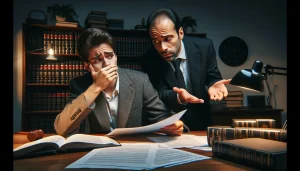Defining a 'Bad' Lawyer
When discussing the characteristics that define a 'bad' lawyer, there are several aspects to consider. These factors include lack of communication, poor ethical standards, inadequate knowledge or skills, and focused more on profit than on client welfare.
Lack of Communication
One trait of a 'bad' lawyer is a lack of effective communication. They fail to keep their clients informed about the progress of their case, don't respond to calls and emails on time, and do not adequately explain legal jargon, court procedures, or potential outcomes. This can leave clients feeling frustrated and neglected, unsure of where their case stands or what steps they should be taking to assist with their situation.
Poor Ethical Standards
Lawyers are bound by ethical obligations to act in the best interest of their clients. A 'bad' lawyer might neglect these principles, engaging in unprofessional behaviour like missing deadlines, misrepresenting facts, or misusing client funds. Such unethical practices not only violate professional codes but also jeopardize the client's trust and the outcome of their case.

Inadequate Knowledge or Skills
A lawyer's expertise and competence in handling particular types of cases significantly impact the results. A 'bad' lawyer might lack the necessary knowledge or skills to effectively represent a client in their specific legal matter. This inefficiency could stem from a lack of understanding of the law, failure to keep up-to-date with legal developments, or inability to prepare and present a persuasive case.
Profit Driven
While being financially motivated is not inherently wrong, some lawyers tip the balance too far towards profit at the expense of their client's welfare. A 'bad' lawyer might prioritize financial gain over the interest of the client, leading to rushed work, insufficient attention to detail, or unnecessary litigation that only serves to increase legal fees.
Understanding these signs can help individuals avoid unscrupulous lawyers and make an informed decision when choosing legal representation. The right lawyer should be communicative, ethical, knowledgeable, skillful, and have the client's best interest at heart.
Types of Bad Lawyers
The Incompetent Practitioner
These types of lawyers lack the necessary skills to adequately represent their clients in a court of law. Despite having the necessary qualifications on paper, they fail to use their knowledge to build strong cases. This can result in missed deadlines, unpreparedness during court proceedings, and failure to follow up on important matters. Their poor performance often leads to undesirable outcomes for their clients.
The Unethical Counselor
Unethical lawyers are those who ignore professional principles and regulations in their quest for success. They may make false promises, overcharge clients, or even manipulate evidence to win cases. Their dishonest actions not only harm their clients' interests but also tarnish the legal profession's reputation.
The Unresponsive Advocate
Unresponsiveness is another trait of a bad lawyer. These legal practitioners do not maintain effective and regular communication with their clients. They often disregard phone calls, emails, and other modes of communication. The lack of open dialogue leaves the client feeling neglected and uninformed about their case progression.
The Profit-Driven Attorney
While every professional needs to make a living, some attorneys take this a step too far by constantly prioritizing their profits over their clients' best interests. They may engage in unnecessary litigation, delay settlements, or overwork a simple case, all in an effort to bill more hours. The focus on financial gain often compromises the quality of their services.
The Lawyer with Poor Interpersonal Skills
Lastly, we have lawyers who lack the requisite interpersonal skills needed for successful legal practice. They may be rude, arrogant, or insensitive, making it difficult for clients to express themselves freely. Additionally, poor interpersonal skills often lead to strained relationships with other legal professionals, which could negatively impact a client's case.
Signs You May Have a Bad Lawyer
Poor or Lack of Communication
One of the earliest and most apparent signs you may have a bad lawyer is inadequate or no communication. A good lawyer maintains open lines of communication with their client, keeping them informed about case progress and legal procedures. However, if your lawyer often fails to respond to your calls, emails, or texts, this could indicate a lack of professionalism and care about your case.
Disorganized Case Management
Another alarming sign is disorganized case management. If your lawyer is often late to appointments, misses deadlines, or appears unprepared during meetings or court appearances, it could suggest that your case is not a priority. Also, if they frequently misplace critical documents or seem unfamiliar with your case details, it may reflect poorly on their organizational skills and dedication.
Ethical Violations
Ethical violations are a serious red flag when assessing a lawyer's credibility. This can range from leaking confidential information, mixing personal and client funds, to making false statements in court. It is critical to understand that any form of dishonesty violates the attorney-client relationship and raises questions about the lawyer's integrity.
Inadequate Legal Strategy
If your lawyer does not seem to have a clear legal strategy for your
Case, it may be a sign that they lack experience or competence. A good lawyer will provide a well-structured plan, explain possible outcomes, and discuss potential risks with you. On the other hand, a lawyer who routinely appears unsure or changes strategies without valid reasons could lead to a negative outcome for your case.
Excessive Legal Costs
Legal fees should be transparent and reasonable. If your lawyer's charges seem excessive or if they are vague about billing procedures, this could indicate financial exploitation. Always ensure you have a clear understanding of how your lawyer will bill you to avoid unwarranted financial surprises.
Consequences of Hiring a Bad Lawyer
Compromised Quality of Legal Representation
When you hire a bad lawyer, the quality of your legal representation can significantly suffer. Lawyers with insufficient expertise or interest in your case may overlook important details, fail to meet deadlines, or make mistakes that could cost you dearly. They might lack the necessary skills, experience, or dedication required to ensure the best possible outcome for your case.
Increased Financial Burden
Hiring a bad lawyer can lead to unnecessary costs. Not only will you be paying for their services, but poor legal advice or actions could result in financial penalties, lost settlements or, in the worst-case scenario, costly retrials. Furthermore, addressing and rectifying their mistakes could require hiring another lawyer, further escalating your expenditure.
Loss of Time
Time is a crucial element in any legal proceeding. Unnecessary delays, failure to meet deadlines, or the need to correct errors can hold up your case, costing you precious time. In many cases, time lost due to poor legal representation can never be regained, potentially affecting the success of your case.
Negative Impact on Your Case Outcome
A bad lawyer's incompetency can potentially lead to unfavorable outcomes, such as losing a case that could otherwise be won, or receiving a less favorable settlement than you deserve. This can be detrimental in situations involving
Criminal charges, divorce proceedings, business disputes,
Personal injury claims, and other significant legal matters.
Emotional Distress
Navigating the legal system is stressful enough without the added worry of a lawyer who isn't doing their job effectively. A lawyer's inadequacy can generate extra stress, frustration, and even heartache, particularly in sensitive cases involving family, health or livelihood. Their lack of clear communication, empathy, or understanding can add to an already emotionally charged environment.
How to Deal With a Bad Lawyer
Identify the Issues with Your Lawyer
To address a problem effectively, one must first recognize what it is. Consequently, it's important to identify why you consider your lawyer to be 'bad'. They may lack communication skills, or they might consistently miss deadlines, neglect your
Case, or even mishandle your money. Gather evidence of their malpractice such as emails, letters, and other forms of communication.
Communicate Your Concerns Clearly
Once the core issues have been identified, it's time to communicate your concerns. Speak directly with your lawyer about the problems you've perceived. Be clear about your expectations and ask how they can meet them. This discussion could resolve some misunderstandings, and subsequently, their performance may improve.
Contact Your Local Bar Association
If direct communication does not solve your issues, then it's appropriate to contact your local bar association. Many bar associations have dispute resolution programs to handle complaints about lawyers. Be prepared to provide evidence of your lawyer's incompetence or ethical violations.
Considering Mediation or Arbitration
Sometimes, legal issues can be resolved through mediation or arbitration. During this process, a neutral third party helps facilitate a discussion and, in the case of arbitration, makes a decision. This step can be less expensive and faster than going to court.
Switching to a New Lawyer
Ultimately, if your lawyer consistently fails to meet your expectations despite your efforts to rectify the situation, you may need to consider finding a new lawyer. Terminate your agreement with your current lawyer formally, and make sure to retrieve your files. It's important to find a competent, credible new lawyer who will be keen to take on your case.
Preventing Run-Ins With Bad Lawyers
Know Your Legal Rights
Understanding your legal rights can be the first step in preventing run-ins with bad lawyers. Educate yourself about the basics of the law related to your
Case. Having a broad understanding of laws and legal procedures allows you to spot when a lawyer is not acting in your best interests. Online resources, local libraries, and legal aid organizations can provide substantial help in this regard.
Perform Thorough Background Checks
Before engaging with a lawyer, make sure to conduct a comprehensive background check. This should encompass their education, experience, specialization, and track record of handling similar cases. Moreover, verify their standing with the local and state bar association. A lawyer disbarred or punished for misconduct should be a red flag.
The Importance of Second Opinions
Just as with medical diagnoses, second opinions are valuable when dealing with legal matters. If a lawyer's advice or strategy seems questionable, consult another professional. This wouldn't necessarily mean that your current lawyer is 'bad', but being too reliant on a single lawyer's opinion could limit your options.
Establish Clear Communication Channels
Effective communication is critical in any relationship, including between a client and a lawyer. Ensure that the lawyer you're considering is responsive, clear in explaining legal jargon, and transparent about the progress of your case. Lack of communication and transparency could suggest a problem.
Trust Your Gut
Sometimes, maintaining distance from a bad lawyer comes down to your instinct. If something doesn't feel right about how a lawyer behaves or handles your
Case, it might be appropriate to consider other options. Always remember that it's better to prevent a bad situation than to fix one.
Understanding the Role of a Good Lawyer

Recognizing the Legal Expertise of a Competent Lawyer
A good lawyer should have both a comprehensive knowledge of the law and practical courtroom experience. They should be able to provide clear, concise legal advice and have the ability to interpret complex legal jargon into straightforward language for their clients. Good lawyers keep up-to-date with all changes and developments in the law and use their wealth of knowledge to make informed decisions about cases.
Evaluating Communication Skills and Confidentiality
Effective communication is a fundamental skill for any good lawyer. They should be excellent listeners and equally efficient at articulating their thoughts. Maintaining open and consistent communication with clients to keep them informed about their
Cases is imperative. Additionally, a good lawyer must uphold the highest degree of confidentiality, ensuring that all client information is handled discreetly and responsibly.
Assessing Level of Professionalism
An accomplished lawyer approaches each case with utter professionalism. This includes being organized, prepared, and proactive. Punctuality for meetings and court appearances, along with managing deadlines and commitments efficiently, often indicate professional diligence. Also, respectful interaction with clients, court personnel, and other lawyers is a promising sign of a good lawyer.
Valuing Empathy and Ethical Standards
Successful lawyers display genuine empathy towards their clients' situations. They seek to understand their clients' needs and concerns, demonstrating compassion and patience. The level of care they show their clients often reflects their dedication and commitment to their roles. Furthermore, they need to adhere strictly to the ethical guidelines set by the bar association, ensuring fair play and utmost integrity in all dealings.
Understanding Strategic Mindset and Negotiation Skills
A good lawyer is a strategic thinker who can anticipate likely outcomes and plan accordingly. They are adept at developing effective legal strategies tailored to each unique case. Moreover, they are skillful negotiators, leveraging their knowledge and experience to negotiate favorable terms and settlements on behalf of their clients.
Conclusion
A bad lawyer is typically referred to as an ineffective, incompetent, or unethical attorney. These individuals may fail to uphold their professional responsibilities, leading to negative outcomes for their clients. It's crucial to carefully select a qualified and reputable lawyer to ensure proper legal representation.
Look for an attorney who has the right legal resources for your legal needs.
Contact us here on the
Warmuth Law website or through our hotline 888-517-9888.
Frequently Asked Questions (FAQ's)
1. What do you call a bad lawyer?
A bad lawyer is often described as an attorney who is incompetent or ineffective in representing their clients. They may not possess the necessary skills, experience, or ethical standards to handle legal matters properly.
2. How can you identify a bad lawyer?
Identifying a bad lawyer can involve looking out for several signs. These may include poor communication, where the lawyer fails to keep you informed about your
Case. Lack of preparation is another red flag, as a good lawyer should be thoroughly prepared for all legal proceedings. Missing deadlines or showing unethical behavior are also indicators of a bad lawyer. Additionally, a history of unsuccessful cases may suggest that the lawyer is not capable of achieving favorable outcomes for their clients.
3. What should I do if I have hired a bad lawyer?
If you believe you have hired a bad lawyer, it's important to take action. Consider seeking a second opinion from another attorney to evaluate your case. You may also want to file a complaint with the state bar association, which oversees the conduct of lawyers. Exploring legal options for recourse, such as seeking a refund or compensation for any damages caused by the bad lawyer, is also advisable.
4. What are the consequences of hiring a bad lawyer?
Hiring a bad lawyer can have serious consequences. It can lead to loss of time, money, and legal rights. A bad lawyer may mishandle your case, resulting in unfavorable legal outcomes. Additionally, it can cause emotional stress and frustration, as you may feel let down by the legal representation you received.
5. How can I avoid hiring a bad lawyer?
To avoid hiring a bad lawyer, it's important to do thorough research before making your selection. Look for reviews and testimonials from past clients. Ask for referrals from friends, family, or other trusted sources. Meet with the lawyer in person to discuss your case and get a sense of their communication style and approach. Trust your instincts and choose a lawyer who you feel confident will represent your interests effectively.













